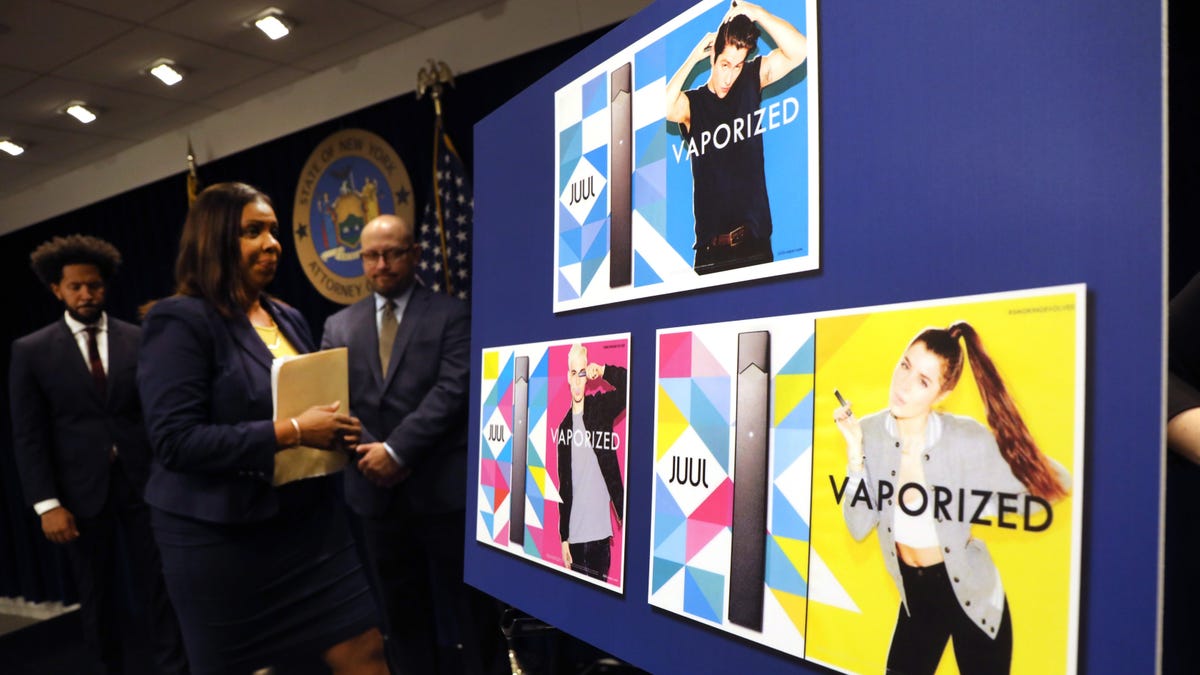Juul Agrees to Nearly $440 Million Settlement Over Marketing Vapes to Kids - 4 minutes read

Juul’s 2022 just went from bad to worse. The e-cigarette maker somehow managed to narrowly survive (at least for now) a Federal Drug Administration effort to ban its products nationwide only to get smacked with a settlement worth nearly half a billion this week.
On Tuesday, the company agreed to cough up $439 million to put to rest a two-year-old investigation led by 33 states and Puerto Rico seeking to determine whether the vaping giant markets its products to children and teens. In addition to the bulky monetary penalty, Juul will reportedly agree to a lengthy list of injunctive terms with the effect of winnowing down the company’s marketing and sales practices.
As part of the settlement, Juul reportedly agreed to cease marketing to individuals under the age of 35, refrain from advertising on public transportation, no longer recruit influencers to help push its products, and discontinue funding of so-called education programs, according to Bloomberg. Juul will reportedly pay out the monetary penalty over six to 10 years with the penalty rising the longer the company takes to pay it off. Juul could wind up paying $476.6 million if it takes the entire 10 years to pay the penalty.
“JUUL relentlessly marketed vaping products to underage youth, manipulated their chemical composition to be palatable to inexperienced users, employed an inadequate age verification process, and misled consumers about the nicotine content and addictiveness of its products,” Connecticut Attorney General William Tong said in a statement. “Through this settlement, we secured hundreds of millions of dollars to help reduce nicotine use and forced JUUL to accept a series of strict injunctive terms to end youth marketing and crack down on underage sales.”
Juul, meanwhile, acknowledged the settlement in a brief statement on its website.
“We remain focused on the future as we work to fulfill our mission to transition adult smokers away from cigarettes—the number one cause of preventable death—while combating underage use,” Juul said.
Juul did not immediately respond to Gizmodo’s request for comment.
Attorneys Generals from Connecticut, Florida, Nevada, Oregon and Texas led an expansive, bipartisan, multistate investigation dating back to 2020. Ken Paxton, the Texas AG, alleges Juul achieved its dominant status atop Vape Mountain by, “willfully engaging in an advertising campaign that appealed to youth.” Juul allegedly used young models, launch parties and free samples to market towards underage customers. The investigation also took issue with Juul’s early packaging which allegedly didn’t clearly state the devices used nicotine.
“With a technology-focused, sleek design that could easily be concealed, JUUL sold its products in flavors known to be attractive to underage users,” Paxton’s office said on its website. “JUUL also manipulated the chemical composition of its product to make the vapor less harsh on the throats of young and inexperienced users. To preserve its underage customer base, JUUL relied on age verification techniques that it knew were ineffective.”
Juul’s hazy future
Tuesday’s settlements put to bed one of the biggest immediate threats to Juul’s business, but the company’s troubles are far from over. Juul still faces nine additional lawsuits from other states, ABC News notes, as well hundreds of lawsuits from minors who claim they got hooked on vaping because of Juul. And then there’s the whole saga with Biden’s Food and Drug Administration.
The FDA unexpectedly ramped up efforts to curb Juul’s reach back in June when it issued a marketing denial order to Juul, effectively banning it from selling its products in the U.S. Though the FDA previously wounded Juul with a ban on pod-based e-cig flavors other than Tobacco or Menthol (in other words, all the good ones) the agency’s most recent ban went for the jugular.
Yet, somehow, the company’s managed to cling on to life. The company appealed the FDA’s “extraordinary and unlawful” ban less than 24 hours after the announcement. In their appeal, Juul shot back at the FDA for allegedly singling them out among a crowded field of nicotine products. Then, in July the FDA walked back its ban, announcing its decision to stay the marketing denial due to “numerous scientific issues unique to the JUUL application that warrant additional review.”
In its statement Tuesday, Juul expressed confidence that the FDA would rescind its marketing denial after the FDA, “does a complete review of all of the science and evidence.”
Source: Gizmodo.com
Powered by NewsAPI.org